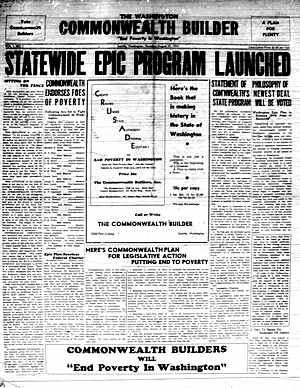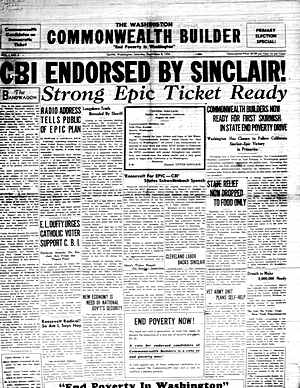
In this founding issue of the weekly, the Commonwealth Builders outlined the End Poverty in Washington program modeled on Upton Sinclair's EPIC plan.
The EPIC movement spread outside California, especially along the West Coast. In Washington State, the EPIW campaign was ultimately more successful than the California campaign. EPIW elected a number of candidates in 1934, including a US Senator.
The organization adopted the name Commonwealth Builders Inc. when formed in the summer of 1934 as news of Sinclair's electrifying campaign spread north. A weekly newspaper,Washington Commonwealth Builder, appeared on August 23 announcing an End Poverty in Washington program along with a slate of candidates for the upcoming Democratic primary election. When forty-five CBI candidates for local, state, and federal offices won their primary contests in September, it was clear that a new political force had taken shape.
In the November general election, CBI elected a US senator, Lewis Schwellenbach, eight state senators, and twenty-seven state representatives. As in California, the campaign had remade the Democratic Party. Radicals, who for generations had tried to build independent third parties, poured into the party that had until recently been associated with prohibition in the solidly Republican far West. Now the Washington Democratic Party would grow and lean left, pushed by the Commonwealth Builders and successor organizations.

A slate of candidates pledged to the End Poverty in Washington plan was announced in the September 8 issue
In 1935, the CBI renamed and reorganized itself, becoming the Washington Commonwealth Federation with chapters througout the state. Representing a broad alliance of radical organizations, unions, and liberal
activists the WCF operated as a left-wing caucus within the Democratic Party for the next decade and a half, electing progressive candidates to state and local offices, and sending several to the US Senate and Congress.
With tens of thousands of members, an influential newspaper, and an array of linked organizations, the WCF mobilized progressive Washington State residents into a political caucus that was broadly influential. By the end of the 1930s Washington State had some of the most liberal and comprehensive labor and social legislation thanks to the political power of the WCF.
Read more:
Here are detailed reports on the Commonwealth Builders and the Washington Commonwealth Federation from the Great Depression in Washington State Project and the Communism in Washington State History and Memory Project:
We have detailed reports about the WCF and its impact on Washington politics:
 Washington Commonwealth Builder/Washington Commonwealth, by Jessica Dunahoo
Washington Commonwealth Builder/Washington Commonwealth, by Jessica Dunahoo
The newspapers of the Washington Commonwealth Federation, a left-labor political coalition that reshaped state politics during the Depression.
 Washington New Dealer, by Jonathan Stecker
Washington New Dealer, by Jonathan Stecker
The New Dealer was the final paper, from 1938-1942, of the radical-labor political coalition, the Washington commonwealth Federation.
 The Washington Commonwealth Federation and the Washington Pension Union, by Jennifer Phipps
The Washington Commonwealth Federation and the Washington Pension Union, by Jennifer Phipps
Washington's Communist Party was central to two broader political formations that reshaped state politics, reform, and social services.
 “To Vote Democratic, Vote Commonwealth”: The Washington Commonwealth Federation's 1936 Electoral Victory, by Drew May
“To Vote Democratic, Vote Commonwealth”: The Washington Commonwealth Federation's 1936 Electoral Victory, by Drew May
The left/labor political coalition launched a 1936 electoral campaign to challenge the right wing, anti-New Deal Democrats in Washington State, as well as advocate radical propoerty redistribution and social insurance policies.
 Building the People's Republic in Washington State: The Washington Commonwealth Federation, Comintern Foreign Policy, and the Second World War, by Skyler Cuthill
Building the People's Republic in Washington State: The Washington Commonwealth Federation, Comintern Foreign Policy, and the Second World War, by Skyler Cuthill
The changes in Soviet foreign policy heavily influenced the foreign policy of the Washington Commonwealth Federation, leading to successes and losses in state politics and public influence.
 “Fascism and Its Ally, Racism”: The Complexities of the Washington Commonwealth Federation's Stance on Civil Rights, by Catherine Roth
“Fascism and Its Ally, Racism”: The Complexities of the Washington Commonwealth Federation's Stance on Civil Rights, by Catherine Roth
The civil rights policies of the Washington Commonwealth Federation, a labor/left political coalition, mirrored the zigzags of the international Communist Party's politics, swerving from defending them to silence around Japanese American internment in World War II.
 The Washington Commonwealth Federation and the Japanese Boycott, 1937-1938, by Chris Kwon
The Washington Commonwealth Federation and the Japanese Boycott, 1937-1938, by Chris Kwon
The labor/radical reform coalition, the Washington Commonwealth Federation, organized an "anti-fascist" boycott against Japanese goods as part of an effort to oppose Japanese imperial expansion into China. However, this stance bled into anti-Japanese sentiment that would culminate in the internment of Japanese Americans during World War II.









